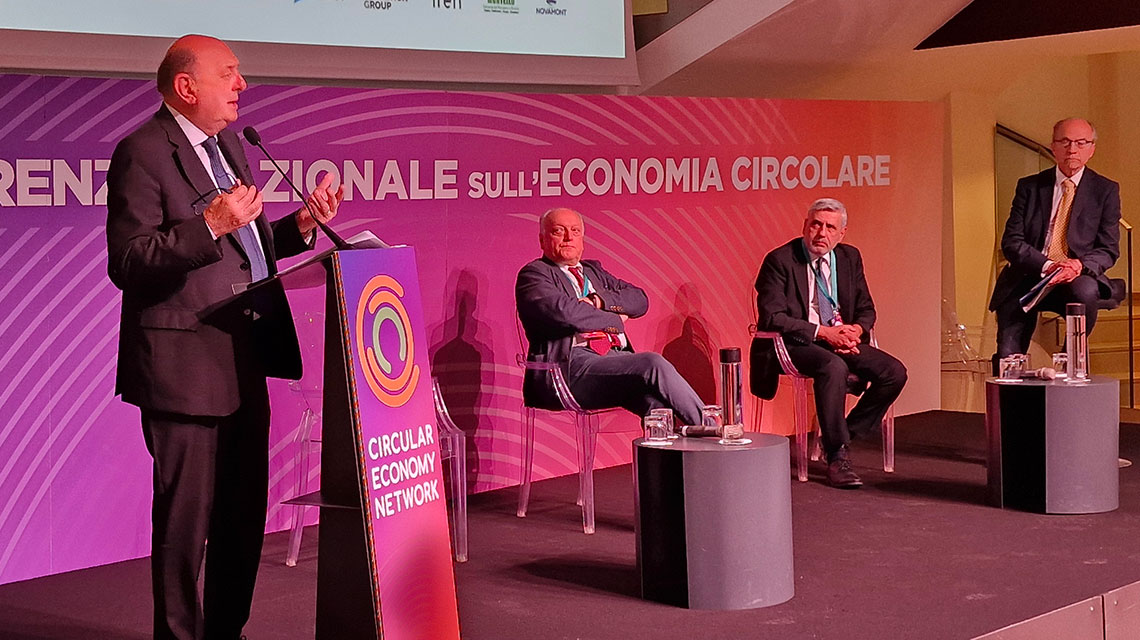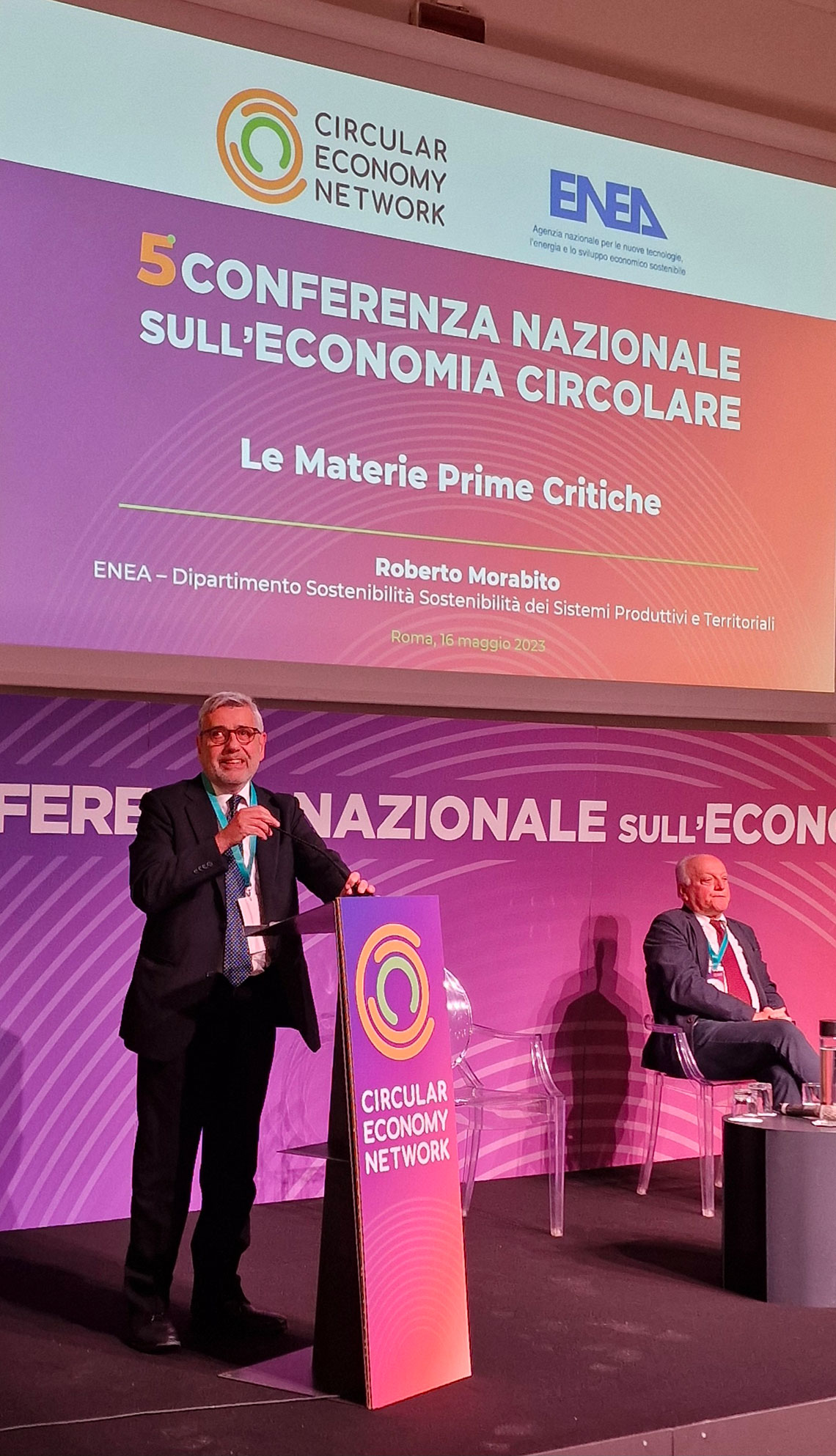Italian National Agency for New Technologies, Energy and Sustainable Economic Development

Environment: Italy remains the leader in the Circular Economy among the EU's top five economies
PRESENTED FIFTH NATIONAL REPORT PREPARED BY THE CIRCULAR ECONOMY NETWORK AND ENEA
Despite the many environmental alarms scientists are sounding, the rate of circularity in the world economy is declining, going from 9.1% to 7.2% in five years. In other words, the Planet recycles and reuses less. Italy -among the top five EU economies- remains the most circular country in Europe, although in the last five years it has lost positions and other states are accelerating: we cannot rest on our laurels, more must be done to maintain our leadership.
The circular material use rate in Italy is 18.4%. It remains higher than the EU average (11.7%) in 2021 - the latest data available - but we were at 20.6% in 2020 and 19.5% in 2019. For resource productivity we are, together with France, ahead of the other main European economies with 3.2 euro generated for each kg of material consumed, and in the lead in the recycling rate of total waste generated, with 72%. In the list of the EU’s five main circular economies (Italy, Germany, France, Spain and Poland) we remain leaders although we have trended down over the last five years: Spain follows closely behind us and is progressing faster than Italy, according to the data contained in the fifth edition of the National Report on the circular economy prepared by the Circular Economy Network –in collaboration with ENEA, under the patronage of the European Commission, the Ministry of the Environment and Energy Security and the Ministry of Enterprises and Made in Italy- presented on 16 May 2023 in Rome at the Nazionale Spazio Eventi in via Palermo, also in live streaming.
The event, which was opened by Gilberto Pichetto Fratin, Minister of the Environment and Energy Security, was attended by Edo Ronchi, President of the Sustainable Development Foundation, Roberto Morabito, head of the ENEA Department of Sustainability of Production and Territorial Systems, Laura D'Aprile, Head of the Sustainable Development Department, the Ministry of the Environment and Energy Security, Barbara Clementi, Head of the Circular Economy Division, DG for industrial policy, innovation and small and medium-sized enterprises, the Ministry of Enterprises and Made in Italy, Katia Da Ros, Confindustria Vice-President for the Environment, Stefano Ciafani, Legambiente President, Giorgio Graziani, CISL Confederal Secretary.
The data on which the analysis is based is worrying: the global economy is consuming over 100 billion tonnes of materials a year. Accelerating the transition to a circular economy would contribute to improve the planet’s health, because the extraction of virgin material could be reduced by over a third (-34%) and greenhouse gas emissions curbed by limiting global temperature rise to 2°C, safeguarding irreplaceable ecosystems vital to our planet’s life. But it would also entail significant economic benefits. For instance, it would contribute to fight inflation, driven by the rise in the cost of materials and energy: strategies aimed at recovery of materials and energy have a clear deflationary effect.
“We need to embrace circularity with more conviction also to fight inflation: if the cost of raw materials and resources increases, circularity is a concrete response to the crisis. It’s crucial to implement all the tools needed to fully embrace a circular economy", said Edo Ronchi, President of the Circular Economy Network (CEN). “In particular, as Circular Economy Network, we ask to respect the timetable for the implementation of the national strategy for the circular economy, promptly implement the European measures, strengthen support for businesses, include ecological taxation measures in the enabling law. It is also necessary to develop the circular economy of critical raw materials, guarantee the construction of the plants envisaged by the PNRR, accelerate construction of recycling plants and the already financed 'lighthouse projects', to bridge the gap between the Centre-South and the North and ensure adequate equipment. As concerns waste, it is crucial to fully implement the National Waste Management Programme, update the Regional Plans by the end of the year to achieve the EU recycling and landfill reduction targets, accelerate and simplify regulations on End of Waste, develop industrial symbiosis, as well as adopt the national waste prevention program”.
“Italy imports over 99% of its critical raw materials, showing an even more dramatic dependence on foreign countries than Europe,” said Roberto Morabito, Head of the ENEA Department of Sustainability of Production and Territorial Systems. “Critical raw materials are essential for the hi-tech supply chains most linked to the energy, circular, digital transition and to the quality of life in general. Following the emergencies of recent years, the demand for raw materials on a global level has risen sharply, as has their price, resulting in an increase in procurement risk with a consequent negative impact on the competitiveness of our production chains, which represent over 30 % of national GDP. For Italy, decidedly poorer in raw materials than its competitors, embracing circularity is an imperative, from the eco-design of products to recovery and recycling, exploiting our urban mines, which are potentially the most readily accessible sources of raw materials.
Italy confirms its leading position among the top five European Union economies
The overall circularity ranking in the main five economies of the European Union (France, Germany, Italy, Poland, Spain) is based on seven indicators: waste recycling rate; rate of use of material from recycling; resource productivity; relationship between waste production and material consumption; share of energy from renewable sources in total gross energy consumption; repair; land consumption. Also for this edition, Italy leads the ranking, totaling 20 points. Followed by Spain (19 points), France (17), Germany (12) and Poland (9). In general, considering the trend of recent years, Italy has improved less than Poland, which starts from very low levels of circularity, and Spain, which is running faster. It has kept the same pace as France and is going a little faster than Germany.
Waste and energy
The waste recycling rate in 2020 was 53% in Europe and 72% in Italy, one of the highest in the EU. Compared to other main European economies, in 2020 Italy consolidated its leadership, surpassing Germany by about 17 points. The growth rate over the last ten years remained unchanged for the EU, while it rose by 8% in Italy and 3% in Spain. As regards per capita values, Italy is first with 969 kg/inhabitant per year sent for recycling, followed by Germany (921) , Poland (726), France (625) and Spain (472).
The trend in the circular material user rate (the ratio of the circular use of materials to the overall material use, i.e. from virgin raw materials + recycled materials) is less positive for Italy. In the EU in 2021 this value averaged 11.7%, - 0.1% compared to 2020. in 2021 for the first time Italy suffered a decline, settling at 18.4% (2. 2% less than the previous year), losing primacy among the five main European economies, overtaken by France, in the lead with 1.4% more.
In 2021 on average, in Europe, with purchasing power parity, 2.1 euro of GDP will be generated for every kg of resources consumed. Italy (-7% in the last two years) was joined by France: both are at 3.2 €/kg, followed by Germany (2.7 €/kg) and Spain (2.6 €/kg), while Poland is far behind (0.8 €/kg).
Companies that repair
In 2020 Italy, with almost 24,000 companies which repair items, ranked third in the five most important economies in Europe, behind France (35,300 companies) and Spain (29,100). In the last ten years, however, the number has decreased: 2,622 fewer than in 2011, almost -10%. They are also declining in Poland, while they are growing in Spain, France and Germany.
In Italy the value of production generated by companies exceeds 2.1 billion euro (+122 million euro compared to 2011). We are behind France (€4.5 billions), on an equal footing with Spain and ahead of Germany (€2 billions). There were almost 10,800 workers in repair companies operating in Italy in 2020 (down by about 1,500 compared to 2019 and by about 2,300 compared to 2011), while Germany, Spain and France employ more than double the number of workers than Italy.
A survey on Italian consumption habits
A survey, conducted by the CEN and Legacoop in collaboration with the IPSOS, on a representative sample of citizens, was also presented at the Conference on the circular economy, which confirms the propensity of Italians toward circularity.
In the last 3 years, in fact, almost one Italian out of 2 (45% of the interviewees) has purchased a used item and one out of 3 (36% of the sample) a reconditioned or regenerated item. Over 80% of the people interviewed thinks that reducing packaging is important. Leasing, rental and sharing are used more than the average (+ 10-11%) by the population aged between 18 and 30 years. The under 30s, however, are the most skeptical of the proposals to encourage a more circular approach to purchasing choices, they have little faith in the capability of strenghtening the governance of the sector.
The summary of results is available on www.circulareconomynetwork.it. The survey was illustrated by Mattia Granata, Legacoop study centre. Simone Gamberini, President of Legacoop and Marco Frey, Full Professor of Economics and Business Management, Scuola Universitaria Superiore Sant'Anna of Pisa, explored the theme of consumer choices.
After the presentation panel of the V Report on the circular economy, representatives of some companies and consortia from Burgo, Cobat, Conai, Conou, Ecopneus, Erion, Federbeton, IEG, Iren, Novamont took the floor.

